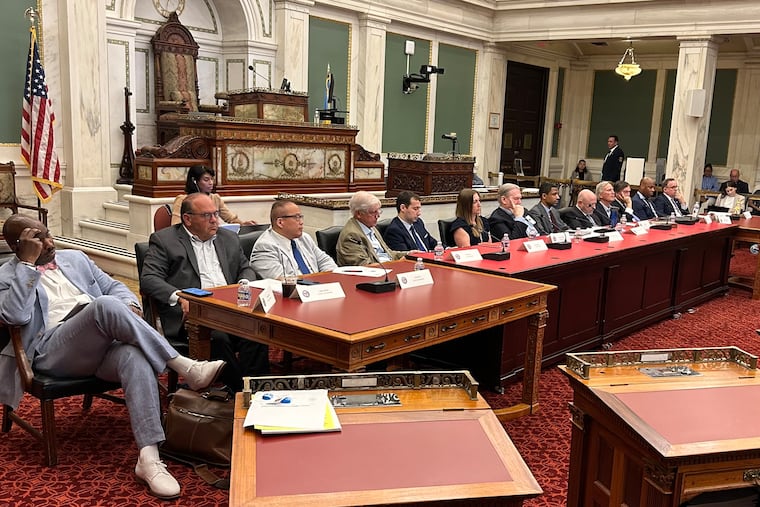Changes could be coming to Philly’s tax structure. Here’s what you need to know.
But while there’s plenty of criticism, there’s little consensus on how the city should reshape its overall tax structure in a way that maintains revenue needed for city services.

There are plenty of critics of Philadelphia’s unusual tax system — but little consensus about how it should be reformed.
To come up with a plan, City Council President Kenyatta Johnson convened a new Tax Reform Commission, which held its first public meeting Monday and is expected to produce policy recommendations this fall.
» READ MORE: How Mayor Parker is changing the conversation on Philly’s tax structure
That would allow Mayor Cherelle L. Parker and Council to consider those proposals during negotiations next year.
Here’s what you need to know about the Tax Reform Commission and how its work could affect you:
What is the Tax Reform Commission?
The Tax Reform Commission is an advisory panel made up of appointees from Council, Parker, City Controller Christy Brady and chambers of commerce.
The commission is co-chaired by venture capitalist Richard Vague and former Council chief financial officer Matt Stitt, who is now a managing director at PFM Group Consulting. Its members include three former Council members who ran for mayor last year: Allan Domb, David Oh, and Derek S. Green.
It’s a business-friendly lineup that is expected to produce some familiar recommendations, such as cuts to the wage tax and reforms or reductions to the business income and receipts tax.
How is Philly’s tax system unusual?
Philadelphia’s $6.37 billion city budget relies more heavily on the wage tax than other large U.S. cities, most of which depend primarily on the property tax and some of which don’t have an income tax at all.
Because the wage tax is more sensitive to economic downturns than property taxes, critics say it subjects the city budget to more volatility. Others contend it discourages economic growth by making the city more costly for workers.
At 3.75% for city residents and 3.44% for people who work in the city but live elsewhere, Philly’s wage tax is the highest flat-rate municipal income tax in the nation.
The property tax, on the other hand, is relatively low at 1.3998% of assessed value.
Since the 1990s, Philly mayors have tried to reduce the city’s reliance on the wage tax by adopting small annual cuts to it while allowing property tax revenue to grow through reassessments. But shifting the balance to the property tax more rapidly is politically challenging because Philadelphia has an unusually high number of low-income homeowners.
What happened at the hearing?
The commission heard Monday from a variety of stakeholders. William Carter, the vice president of local government affairs at the Chamber of Commerce for Greater Philadelphia, said businesses that choose not to invest in the city often cite the wage tax and the business income and receipts tax, which is applied both to businesses’ net profits and their gross receipts.
“Currently, too many businesses are dissuaded from locating here due to, among other things, the high cost of doing business here,” Carter said. “Employers often cite the highest-in-the-nation wage tax and the double-tax for the BIRT as major factors.”
But Andrew Knox, who works at the Free Library of Philadelphia, argued that city services will suffer if taxes are cut.
“If this commission slashes taxes for corporations and the very wealthy, I fear we will be one recession away from the bad old days of 2008, when Mayor Nutter proposed closing 11 library branches,” Knox said.
Here is what others had to say:
Robert Zuritsky of the Parkway Corporation argued for tax relief for his industry due to the city’s high parking tax rate of 22.5%.
Danny Grace of the Teamsters Local 830 called for the elimination of the tax on sweetened beverages championed by former Mayor Jim Kenney.
Jonathan Sgro of Community Legal Services called on the city to improve the accuracy of property assessments, which he said are more likely to result in homes in low-income neighborhoods being overvalued.
Tim Kearney, development director of the Tenant Union Representative Network, called for exempting low-income Philadelphians from the wage tax and implementing Councilmember Kendra Brooks’ proposal to create a city “wealth tax” on investment income.
What does this mean for my taxes?
It’s impossible to say how elected officials will respond to the commission’s report later this year, but it is likely to be the foundation for a major push for wage and business tax reductions.
In recent years, there has been a consistent majority on Council in favor of cutting the wage or business taxes or both, and that conversation is likely to continue. Parker, a former Council member who voted for those cuts in the past, pushed to keep those tax rates flat this year but has said she is still in favor of reducing them in the long term.
Meanwhile, the city is expected to release new property assessments this month, and many homeowners will see significant increases.
Council consequently increased the homestead exemption, which reduces assessments for owner-occupied homes from $80,000 to $100,000, saving many homeowners an additional $280 next year. It also adopted a measure that will freeze tax bills for low-income Philadelphians who see their assessments rise.